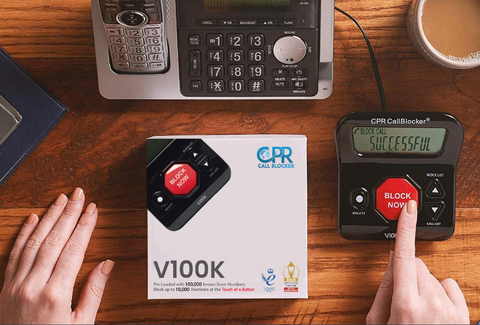The use of landline phones for making and receiving calls has been steadily declining over the years due to the rise of mobile phones and other communication technologies. However, many people in the UK still rely on landlines for various reasons, including a reliable and consistent service for business or personal use. Unfortunately, this has made landline phones a prime target for telemarketing and scam calls.
In this blog, we'll explore the impact of call blockers on telemarketing and scam calls on landlines in the UK.
Telemarketing and Scam Calls in the UK
Telemarketing and scam calls are common nuisances for landline phone users in the UK. These calls are often unsolicited, and their purpose is to trick people into buying goods or services or to steal their personal information.
According to a report by Truecaller, a phone app that blocks spam calls, the UK is the 8th most spammed country in the world. In 2019, Ofcom reported that 2.3 billion unsolicited calls were made in the UK, with 60% of these calls being made to landline numbers.
Common types of scams include investment scams, fake lottery or prize scams, and phishing scams where the caller pretends to be from a reputable organisation such as a bank or government agency. Falling victim to a scam can have serious consequences, including financial losses, identity theft, and emotional distress.

Call Blockers in the UK
Call blockers are devices or software designed to detect and block unwanted calls, including telemarketing and scam calls. Several types of call blockers are available in the UK, including standalone devices, smartphone apps, and call-blocking services provided by phone companies.
One advantage of using call blockers is that they can help to reduce the number of unwanted calls received by landline phone users. Some call blockers can also detect and block calls that use spoofing techniques, where the caller ID information is manipulated to appear as if it is coming from a trusted source.

Feedback from UK Call Blocker Users
Many UK call blocker users report that they have seen a significant reduction in the number of unwanted calls they receive since using a call blocker. In a survey conducted by Ofcom in 2018, 80% of call blocker users reported a decrease in the number of nuisance calls they received, with 40% reporting a significant decrease.
In a separate study by Which?, a UK consumer advocacy group, participants reported receiving an average of 10 unwanted calls per week before using a call blocker. This number dropped to 2 calls per week after using a call blocker.
These findings indicate that call blockers are an effective tool for reducing the number of unwanted calls received by landline phone users in the UK.
Call blockers are effective because they allow users to block specific numbers or types of calls. For example, some call blockers allow users to block all calls from international numbers or specific area codes. By giving users more control over the calls they receive, call blockers can help reduce unwanted calls.
Moreover, call blockers can also help to protect vulnerable individuals from falling victim to scam calls. According to a report by Age UK, older adults are particularly vulnerable to scam calls, with an estimated 3.2 million over-65s targeted by scammers each year. Call blockers can help reduce the number of scam calls these individuals receive, which can help protect them from financial harm.

Legal Framework for Telemarketing and Scam Calls in the UK
In the UK, several regulations govern telemarketing and scam calls. The Privacy and Electronic Communications Regulations (PECR) and the General Data Protection Regulation (GDPR) set out the rules for using personal data for marketing purposes. The PECR requires companies to obtain consent before making marketing calls to individuals. At the same time, the GDPR gives individuals the right to control their data and opt out of marketing communications.
The Information Commissioner's Office (ICO) is responsible for enforcing these regulations and has the power to fine companies that breach these rules. However, scammers often use tactics like spoofing their phone numbers or offshore call centres to avoid detection and prosecution.

Conclusion
Telemarketing and scam calls are a common nuisance for landline phone users in the UK, with billions of unsolicited calls yearly. Call blockers are an effective tool for reducing the number of unwanted calls received by landline phone users, but they have limitations and may inadvertently block legitimate calls.
Nevertheless, many UK call blocker users report a significant reduction in the number of nuisance calls they receive, which suggests that call blockers can effectively solve the problem of telemarketing and scam calls.
It's important to note that call blockers are not a panacea for the problem of telemarketing and scam calls. To truly address the issue, it's necessary to have a comprehensive approach that includes enforcing regulations, public education campaigns, and technological solutions. Working together can make landline phones safer and more enjoyable for everyone.
Our call blockers are created to give you and your family peace of mind at home by shielding you from intrusive phone calls. Please browse our selection of products or contact us so we can assist you.











